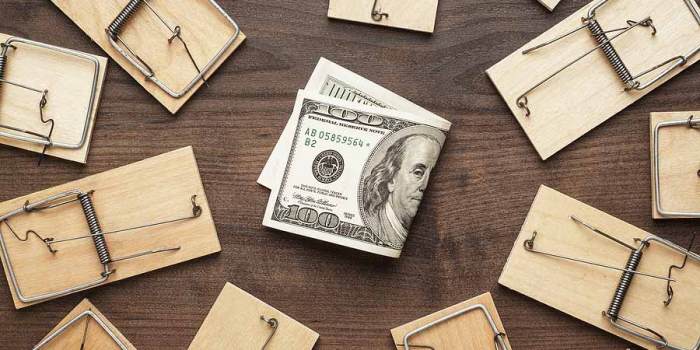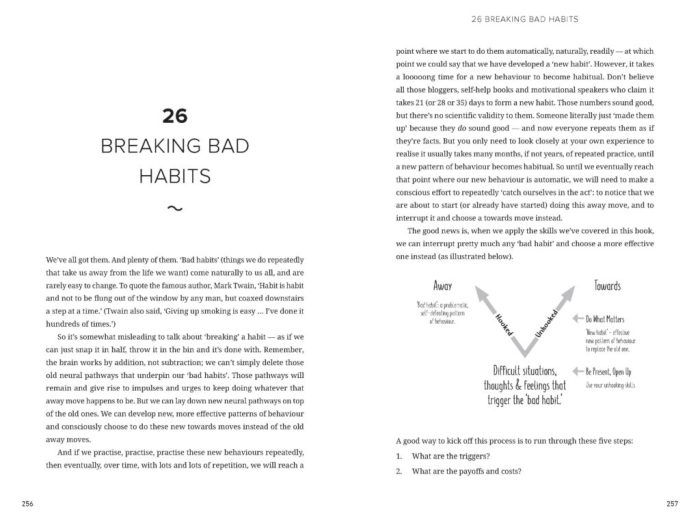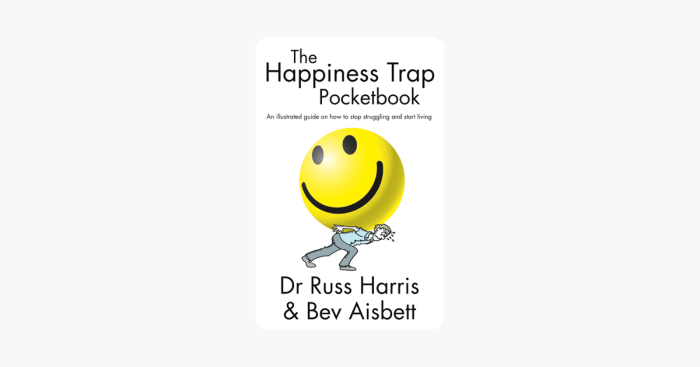The Happiness Trap Extra Bits: A fascinating journey into the hidden forces that can sabotage our pursuit of happiness. Dive into a world where we’ll unravel the cycle of unhappiness, identify the elusive “extra bits,” and uncover the strategies for breaking free from their clutches.
Join us as we explore the emotional and psychological consequences of the happiness trap, and discover the power of mindfulness, self-awareness, and positive thinking in creating a life filled with joy and fulfillment.
The Cycle of Unhappiness

The “happiness trap” is a vicious cycle that can lead to chronic unhappiness and dissatisfaction. It occurs when people become preoccupied with achieving happiness and focus on positive emotions, which can paradoxically lead to negative consequences.
One way people get caught in the happiness trap is by setting unrealistic expectations for themselves. They may believe that they should always be happy, and when they fail to meet these expectations, they feel disappointed and inadequate.
The Happiness Trap’s extra bits delve into practical strategies for breaking free from the trap. For those seeking a more formal look, the USCG Winter Dress Blue Shirt is a classic choice. Returning to the Happiness Trap, its insights empower individuals to live a more fulfilling life, free from the shackles of self-limiting beliefs.
Emotional and Psychological Consequences
The happiness trap can have a number of negative emotional and psychological consequences, including:
- Anxiety and depression
- Low self-esteem
- Relationship problems
- Work-related stress
Identifying the Extra Bits

In the happiness trap, “extra bits” refer to the additional thoughts, feelings, and behaviors that accompany our experiences. These extra bits can be both helpful and harmful, depending on how we interpret and respond to them.
For example, when we experience a setback, we might naturally feel disappointed. However, if we start to dwell on the disappointment, magnify its significance, and engage in negative self-talk, these extra bits can intensify our unhappiness and make it harder to move on.
Types of Extra Bits, The happiness trap extra bits
Common types of extra bits include:
- Negative self-talk:Critical or unkind thoughts directed toward ourselves.
- Magnification:Exaggerating the importance or severity of events.
- Dwelling:Continuously thinking about or rehashing negative experiences.
- Comparison:Unfavorably comparing ourselves to others.
- Avoidance:Avoiding situations or activities that trigger negative emotions.
Breaking Free from the Trap

Breaking free from the happiness trap requires understanding the cycle of unhappiness and identifying the extra bits that contribute to it. Mindfulness and self-awareness play crucial roles in challenging negative thought patterns and changing behaviors.
Strategies for Breaking Free
- Practice mindfulness:Pay attention to the present moment without judgment. Observe thoughts, feelings, and sensations without getting caught up in them.
- Identify extra bits:Recognize the unhelpful thoughts, beliefs, and behaviors that contribute to unhappiness.
- Challenge negative thought patterns:Question the validity of negative thoughts. Are they based on facts or assumptions? Are there alternative perspectives?
- Change behavior:Take small steps to change negative behaviors and engage in activities that promote well-being.
Creating a Happier Life

Breaking free from the happiness trap can lead to numerous benefits, including improved mental health, stronger relationships, and a greater sense of purpose. By letting go of unrealistic expectations and focusing on the present moment, individuals can cultivate a more fulfilling and meaningful life.
Setting Realistic Expectations
Setting realistic expectations is crucial for happiness. Avoid comparing yourself to others and instead focus on your own journey. Understand that setbacks and challenges are part of life, and don’t let them discourage you. Celebrate your accomplishments, no matter how small, and appreciate the good things in your life.
Finding Joy in the Present Moment
The present moment is all we truly have. Dwelling on the past or worrying about the future can rob you of joy. Practice mindfulness to stay present and appreciate the simple pleasures of life. Engage in activities that bring you joy and make time for things that matter to you.
Table of Examples

To illustrate how extra bits can impact various situations, let’s explore the following table:
| Situation | Extra Bit | Impact | Challenge |
|---|---|---|---|
| Job interview | “I’m not good enough.” | Anxiety, self-doubt, poor performance | Challenge the thought: “I have prepared well and have valuable skills.” |
| Romantic relationship | “They’re going to leave me.” | Jealousy, possessiveness, relationship strain | Examine the evidence: “They have not given me any reason to believe they will leave.” |
| Financial planning | “I’ll never have enough money.” | Anxiety, procrastination, financial stress | Create a realistic budget and focus on saving and investing within your means. |
| Health and fitness | “Exercise is too hard.” | Lack of motivation, avoidance of physical activity, weight gain | Start with small, manageable goals and gradually increase the intensity and duration of workouts. |
By identifying and challenging these extra bits, we can break free from their negative impact and create a happier and more fulfilling life.
Case Study: Breaking the Happiness Trap: The Happiness Trap Extra Bits
This case study presents the journey of Sarah, who successfully overcame the happiness trap. Sarah had long struggled with feelings of inadequacy and self-doubt, leading her to pursue external validation and happiness through achievements and material possessions.Sarah recognized that her pursuit of happiness was ultimately unsatisfying and left her feeling empty.
She decided to break free from this cycle by seeking professional help and engaging in self-reflection. Through therapy, she developed coping mechanisms to manage negative thoughts and emotions. She also practiced mindfulness and gratitude, which helped her focus on the present moment and appreciate the good things in her life.
Challenges Faced
Breaking free from the happiness trap was not without its challenges. Sarah faced moments of doubt and setbacks, especially when she experienced negative events or setbacks. However, she persevered by reminding herself of her goals and the progress she had made.
Benefits Experienced
Overcoming the happiness trap has had profound benefits for Sarah. She now has a more realistic and balanced view of happiness, understanding that it is not a constant state but rather a journey with its ups and downs. She has developed a stronger sense of self-worth and resilience, enabling her to navigate life’s challenges with greater ease and confidence.
Sarah’s relationships have also improved as she is now more present and authentic in her interactions with others.
Essential Questionnaire
What are extra bits?
Extra bits are additional thoughts, beliefs, or behaviors that we add to a situation, often without realizing it. They can be helpful or harmful, but they can also trap us in a cycle of unhappiness.
How can I break free from the happiness trap?
Breaking free from the happiness trap requires mindfulness, self-awareness, and a willingness to challenge negative thought patterns. It also involves setting realistic expectations and finding joy in the present moment.
What are the benefits of breaking free from the happiness trap?
Breaking free from the happiness trap can lead to a more fulfilling and meaningful life. It can reduce stress, improve relationships, and increase overall happiness and well-being.